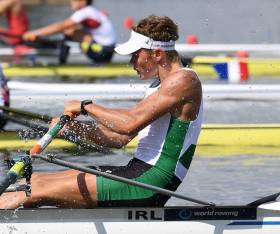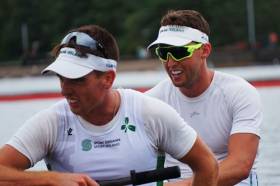Displaying items by tag: Hugh Sutton
Sutton and Legresley Win Time Trial for Cork Sculling Ladder
#Rowing: Hugh Sutton of UCC Rowing Club was the overall winner of the 48th Cork Sculling Ladder time trial, which was run on calm water and on an outgoing tide at the Marina on the River Lee on Sunday. Sutton covered the 1800 metres in seven minutes and 3.4 seconds. Jessica Legresley of Shandon Boat Club won the women’s trial in 7:57.5.
Two previous winners of the the ladder, Jack Dorney and Andy Harrington, set a time of 6:42.1 as they won the first coxless pairs time trial. Amy Mason and Grace Collins won the the women’s pairs time trial in 7:36.1.
The event, which was sponsored by Argos Fire, had a big entry. The oldest competitor on the day was 83-year-old Seamus Quane of Shandon Boat Club.
The sculling and coxless pairs ladders continue with two-boat racing until March 2020.
Gary O'Donovan Tenth Overall at World Rowing Championships
#Rowing: Ireland's Gary O'Donovan took fourth in his B Final of the lightweight single sculls at the World Rowing Championships in Linz-Ottensheim.
Rainer Kepplinger of Austria won, with O'Donovan part of group close behind. The finish puts O'Donovan 10th overall here.
Alice Arch of Australia won the women's lightweight single, with Ireland's Lydia Heaphy fifth. Heaphy had led through the first quarter.
The Ireland lightweight quadruple took second to the United States in their B Final.
World Rowing Championships, Linz-Ottensheim, Day Six (Irish interest)
Men
Lightweight Quadruple - B Final: 1 United States 6:03.94, 2 Ireland (H Sutton, M Taylor, R Ballantine, J McCarthy) 6:06.62.
Lightweight Single - B Final (places 7 to 12): 1 Austria (R Kepplinger) 7:00.16; 4
Ireland (G O'Donovan) 7:02.18.
Women
Lightweight Single - B Final (places 7 to 12): 1 Australia (Alice Arch) 7:52.59; 5 Ireland (L Heaphy) 7:55.40.
#Rowing: The Ireland pair of Mark O’Donovan and Shane O’Driscoll just missed out on a qualifying for the quarter-finals at the World Rowing Championships in Austria today.
The Skibbereen men had to be in the top two in their repechage, but in a three-boat finish, Chile pipped Greece and Ireland were just .66 of a second off qualifying. They go to the E Final.
The lightweight quadruple of Hugh Sutton, Miles Taylor, Ryan Ballantine and Jake McCarthy finished fourth in their heat and will compete in a repechage as they attempt to make the A Final. Italy were very strong and won well, staying clear of Denmark and Austria. Italy qualified for the A Final.
World Rowing Championships, Linz, Austria, Day Two (Irish interest)
Men
Pair - Repechage Two (First Two to Quarter-Finals; Third to Final E): 1 Chile 6:43.70, 2 Greece 6:43.71; 3 Ireland (M O’Donovan, S O’Driscoll) 6:44.35.
Lightweight Quadruple – Heat One (Winner to A Final; rest to Repechage): 4 Ireland (H Sutton, M Taylor, R Ballantine, J McCarthy) 6:04.84
#Rowing: Ireland’s Ronan Byrne won his quarter final of the men’s single sculls at the World Under-23 Rowing Championships in Poznan, Poland, taking a place in the A/B Semi-Finals. The UCC man was the clear leader right through, with Russia and Brazil slotting into the other qualification places for the last 12.
Hugh Sutton finished fifth in his quarter-final of the lightweight single sculls. The top three – Austria, South Africa and Germany – were established early, and Sutton held fifth through the race.
World Under-23 Rowing Championships, Poznan, Poland
Men
Single Sculls – Quarter-Final (First Three to A/B Semi-Finals; rest to C/D Semi-Finals): 1 Ireland (R Byrne) 7:20.26.
Lightweight Single Sculls – Quarter-Final (First Three to A/B Semi-Finals; rest to C/D Semi-Finals): 5 Ireland (H Sutton) 7:55.8.


























































